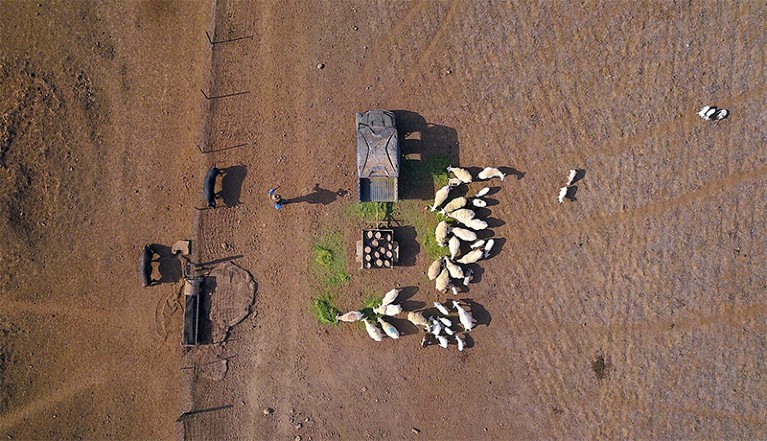Hello Nature readers,
Today we hear that Australia has effectively become the second country to walk away from the Paris climate accord, consider the legacy of the first Muslim Nobel Prize-winner and hear what the inventor of the ‘marshmallow test’ says about self-control.

Large parts of Australia are enduring a crippling drought.Credit: David Gray/Reuters
Australia has no climate-change policy — again
Australia’s new prime minister, Scott Morrison, has abandoned the country’s policy for cutting greenhouse-gas emissions. “They’ve walked away from Paris without saying it, hoping no one would notice,” says climate-change scientist Lesley Hughes. Policies for cutting carbon dioxide pollution have been controversial in Australia, despite large parts of the country facing droughts and bushfires owing to climate change. The government has now become the second advanced economy, after the United States, to drop emissions-reduction policies since the 2015 Paris climate conference.
Nature | 4 min read
Harpoon-throwing satellite takes aim at space junk
The US$17-million RemoveDEBRIS mission is testing a plethora of ways to clean up Earth’s orbit. It will first try to throw and cinch a net around a 1-metre-wide target. It will then test how well lasers can recognize and avoid space junk, and try to harpoon another target. Finally, RemoveDEBRIS will deploy a sail to see whether it can drag the satellite to a fiery death in Earth’s atmosphere.
Nature | 4 min read
AI explores bizarre superconductors
Machine-learning algorithms are helping to unravel the quantum behaviour of relatively high-temperature superconductors called cuprates. To train the algorithms, the team fed neural networks examples of rippled patterns that corresponded to different theoretical predictions that describe the ‘pseudogap’ — visible as ripples of changing electron density that occur when the material is close to superconducting. Over 81 iterations, the algorithms repeatedly identified one modulating pattern that corresponded to the particle-like description of electrons, which dates back to the 1990s.
Nature | 5 min read
Reference: arXiv preprint
Professor alleges assault by Supreme Court nominee
Clinical psychologist Christine Blasey Ford has accused Supreme Court nominee Brett Kavanaugh of sexually assaulting her in the early 1980s. Blasey Ford’s accusations became public over the past week, following the leak of a confidential letter she wrote to senior Democratic lawmakers in August. Kavanaugh has denied the allegation.
The Washington Post | 12 min read
FEATURES & OPINION
The first Muslim Nobel laureate
A new documentary about theoretical physicist Mohammad Abdus Salam explores his complex legacy as the first Muslim and the first (and so far only) Pakistani to win a science-related Nobel prize. The film describes how Salam left his country “with great anguish” to study, yet remains unsung on his home soil because of his minority Ahmadi religious beliefs — to the extent that the word ‘Muslim’ was defaced on his gravestone.
Physics World | 9 min read
Geology teaches time’s true nature
Geologist Marcia Bjornerud describes how working with eras and eons allows geologists to see beyond the “pervasive, stubborn, and dangerous temporal illiteracy in our society”. The moment has come, argues Bjornerud, “for all the sciences to adopt a geologic respect for time” that transcends the limits of our human experiences and allows us to understand our place in Earth’s lifespan.
Nautilus | 15 min read
The marshmallow man’s advice for self-control
Clinical psychologist Walter Mischel, who died on 12 September aged 88, created the iconic marshmallow test, in which he asked children to wait to eat a marshmallow treat in exchange for a bigger reward. In 2014, he shared his advice for delaying gratification: put the temptation at an imaginary distance or picture it as something else, or distract yourself in any way you can.
The New Yorker | 8 min read
